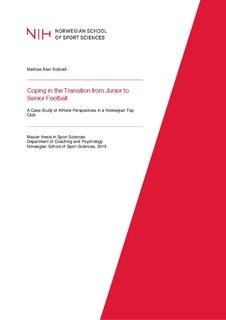| dc.description.abstract | The purpose of this thesis is to further our understanding of the challenges junior football players identify and cope with during the transition to a professional senior contract. Three senior players shared their narrative and the thesis explores and interprets their answers looking for challenges and coping processes. The main research question for the thesis is: How do junior players experience and cope with challenges presented in the transition from junior football to senior professional football in a Norwegian top-level club?
The project introduces relevant and specific theory to create a foundation for the method and procedure. The overall findings indicate that the junior players experience different challenges during the three phases of the transition. The challenges on the pitch differ from the challenges within the dressing room to the challenges outside of sport. The players primarily identify challenges related to social inclusion, to football skill and physical aspects, and with mental processes.
Players cope by using internal resources such as football skill or transition-specific knowledge. They find challenge in prioritizing their career over friends who they perceive to be potentially damaging to their dream, and they feel socially distanced on two fronts. At the club, the players feel distanced and excluded by some of the senior members, especially as they progress to the membership-stage of the transition. Luckily, a select few senior players mentor the junior players through the stages. Another form of external coping is the use of coaches in the club and at school. Family are mentioned as supportive, but only play a smaller role as external resources for coping. The players all experience the level of play to be higher, and the physical demands to be tougher in the senior team. They also note that the most important aspects of coping with challenge is found in the tactical and mental dimension of football. In advising youth in the future, they note that it is important to be true to yourself and mentally prepare for discomfort and social challenges. They also note that adjustments outside of football are necessary regarding recovery and nutrition. | nb_NO |
